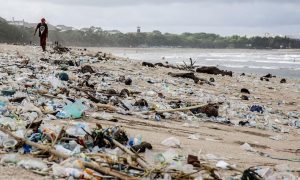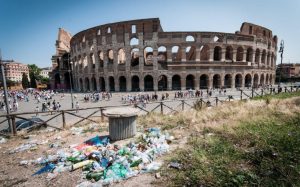On May 21, the World Tourism Organization (UNWTO) announced that during the first quarter of 2019, world tourism grew by 4% compared to 2018, when some 1,400 million travelers were reached around the world1,2. As indicated in its infographic, the income derived from chemical products, fuels or automobiles are very important, these sectors being major causes of environmental problems.
Despite the fact that 4 out of 5 tourists travel within their own region, almost all of them use more or less polluting means of transport for their travels3,4. The pollution produced by commercial aircraft is especially significant5. On the other hand, animals also suffer the consequences of irresponsible tourism. The sale of souvenirs of animal origin6, their use in shows or as entertainment for tourists in various ways, the massive invasion of their habitat, the construction of infrastructures in sensitive areas or the contamination of their environment with plastics —often in countries with Deficient systems of waste management— or polluting products of various kinds, such as sun creams7, negatively affect the flora and fauna of tourist regions around the world. A paradigmatic example of tourism impact is found in Thailand, on the island of Koh Khai. This island has 40,000 square meters and it is visited every year by 1,400,000 people, as pointed out by Thon Thamrongnawasawat, professor of marine biology at Kasetsart University.
The exploitation of people is another consequence of tourism. Enriched countries are the ones that emit the most tourists, and in many cases their destination is impoverished countries in search of lower costs. According to professor Joan Boades in his book “Exporting paradises: The tourist colonization of the planet”, in many of the impoverished countries and within the framework of the prevailing neoliberal policies, tourism offers itself as a quick and simple exit for its economic development. But only the macroeconomic figures increase (with high rates of return, in such a way that most of the profits return to the companies of the enriched countries), without positive repercussions for the people who receive tourism. According to Boades, for the later, the CPI increases more than the incomes of its inhabitants with the consequent decrease in their purchasing power, the price of land increases, social inequalities multiply, much of the access to water and natural resources is lost, labor conditions drastically worsen, traditional productive sectors disappear and the number of women suffering from prostitution increases in line with the economic differences between residents and tourists.
Additionally, the inhabitants of certain regions of the OECD countries also see their quality of life endangered due to the increase in tourism in recent years. The basic services themselves can be saturated by the population increase derived from touristification8, and the access to a stable home is enormously difficult for the most disadvantaged, as a result of the irruption, in recent years, of transnational companies that offer —with the complicity of housing owners and non-intervention or regulation by governments— very affordable prices for short stays, but unreachable for long stays9.
Thus, initiatives that seek to reverse their critical situation arise from the popular classes, fighting for the administrations to act swiftly10, since it is not uncommon for them not to do it or to do it too late11. It is, then, in the hands of impoverished people, and especially the most favored, to act responsibly in the face of an economic activity that, in its most liberal form, threatens the existence of many living beings on the planet, and human beings are not an exception.
1 http://www2.unwto.org/es/press-release/2019-05-21/turismo-internacional-aumentan-las-cifras-y-la-confianza
2 http://cf.cdn.unwto.org/sites/all/files/pdf/unwto_key_figures_barom_may2019_sp.pdf
3 https://www.eldiario.es/economia/turismo-mundial-contamina-veces-calculaba_0_769223175.html
4 https://www.nature.com/articles/s41558-018-0141-x
5 https://www.eea.europa.eu/es/articles/las-emisiones-de-la-aviacion
6 https://www.wwf.es/?47740/Diez-reglas-de-oro-para-evitar-que-los-turistas-sean-cmplices-del-trfico-de-especies
7 https://journals.plos.org/plosone/article?id=10.1371/journal.pone.0065451#s3
8 https://www.revistasavia.com/economia/masificacion/
9 https://www.eldiario.es/zonacritica/turismo-vivienda-Airbnb_6_673392679.html
10 https://www.cerodosbe.com/es/destinos/anti-turismo-red-europa_551774_102.html
11 https://www.eldiario.es/theguardian/Tailandia-indefinidamente-turismo-pelicula-Playa_0_821018220.html
Become Interest:



3 Responses
PALESTINE: THE (ISRAELI) AGREEMENT OF THE CENTURY - IN ACTION)))
[…] TOURISM: AN EVIL FOR THE PLANET […]
UNION FIGHT IN BRAZIL - IN ACTION)))
[…] TOURISM: AN EVIL FOR THE PLANET […]
FUELS FOSSILS: A SOURCE OF ENERGY NO PROFITABLE - IN ACTION)))
[…] TOURISM: AN EVIL FOR THE PLANET […]